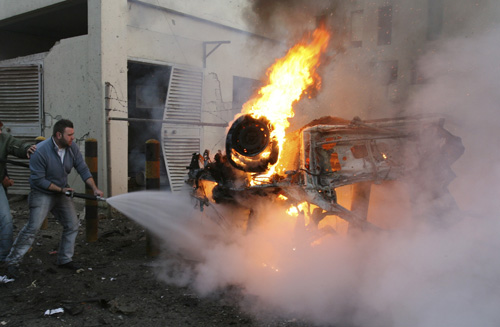U.S. Embassy vehicle targeted by bombers in Beirut, killing 3

Firefighters try to extinguish a burning car at the site of an explosion in Beirut, Lebanon on Tuesday. An explosion targeted a U.S. Embassy vehicle Tuesday in northern Beirut, killing four Lebanese and injuring a local embassy employee, a U.S. official s Vartivar Karageuzian, The Associated Press
January 16, 2008
BEIRUT, Lebanon – A bomb hidden on a Beirut highway hit a U.S. Embassy vehicle Tuesday, killing at least three Lebanese bystanders in the first attack in years targeting American diplomatic interests in the country.
The car’s Lebanese driver and an American at a nearby school were among five people injured.
The blast, just before a farewell reception for the U.S. ambassador in downtown Beirut, came at a time when political tensions are high in Lebanon, with the U.S.-backed government and Syrian-backed opposition deadlocked over choosing a new president.
Secretary of State Condoleezza Rice expressed “outrage” over the attack, calling it an act of terrorism.
“The United States will, of course, not be deterred in its efforts to help the Lebanese people, to help the democratic forces in Lebanon, to help Lebanon resist force and interference in their affairs,” she told reporters while visiting the Saudi capital Riyadh, the latest stop on President Bush’s Mideast tour this week.
Get The Daily Illini in your inbox!
It appeared to be the first time the United States has been targeted in a politically motivated attack in Lebanon since the mid-1980s when U.S. troops were deployed in the aftermath of Israel’s invasion of the country and a civil war was raging.
During that time, Lebanon was the scene of some of the deadliest terrorist attacks against Americans in U.S. history, including the 1983 Marine barracks bombing that killed 241 U.S. service members. That attack prompted then-President Ronald Reagan to withdraw American forces from Lebanon. The same year, the U.S. Embassy was hit by a car bomb, killing 17 Americans.
Tuesday’s bomb was hidden among garbage containers near the main Mediterranean coastal highway in north Beirut’s predominantly Christian Dora-Karantina neighborhood. The powerful blast went off as the armored U.S. Embassy SUV passed.
Mathew Clason, a Minnesota native on a two-week visit to Lebanon, said he was at the nearby National Evangelical Church where he was teaching when the bomb went off.
“The windows blew in and I fell down. I was knocked out. I don’t know exactly what happened,” Clason told Associated Press Television News while sitting in the emergency room corridor of Jeitawi Hospital in Beirut. His head and right leg were bandaged.
The SUV was damaged, but the brunt of the blast was taken by a BMW behind it, in which two people were killed, Lebanese security officials said, speaking on condition of anonymity in line with government policy. The third dead person was not immediately identified.
The explosion – heard across the capital – sent a pall of grey smoke over the highway, damaged several cars and blew out nearby windows.
No Americans were in the targeted car, which was carrying two Lebanese embassy employees, State Department spokesman Sean McCormack said in Washington. The driver was lightly injured, he said.
There were conflicting accounts of the death toll. The State Department, based on information provided by the U.S. Embassy in Beirut, said four people had been killed. But Lebanese Red Cross spokesman Iyad al-Munzer said three were killed, and two senior Lebanese security officials corroborated that.
Five people were injured, including the American Clason and the driver. The identities of the other three injured people were not available.
The U.S. Embassy immediately canceled a banquet for departing Ambassador Jeffrey Feltman, scheduled for Tuesday evening at Beirut’s seaside Phoenicia Hotel about two miles away from where the blast occurred. It was not clear whether the employees in the car targeted were heading to the banquet.
McCormack said agents from the State Department’s Bureau of Diplomatic Security would be working with Lebanese authorities to investigate the attack and that the U.S. Embassy in Beirut was reviewing its security.
“We are going to take a look at what implications, if any, there are for our security posture in Beirut,” McCormack said.
Western-backed Prime Minister Fuad Saniora called an emergency cabinet meeting late Tuesday after the blast.
Lebanon has been rattled by a string of bombings over the past three years. Most have targeted anti-Syrian politicians and journalists, killing eight. But in recent months, the targets have become more varied: a top Lebanese army general was killed in December, and last Tuesday, a roadside bomb hit a U.N. peacekeepers’ vehicle on a Beirut highway, injuring two.
Washington has strongly backed Saniora’s anti-Syrian government in its long political standoff with the opposition led by Syria’s ally, the Shiite militant group Hezbollah. Each side often accuses the other’s international patron of seeking to control Lebanon.
Hezbollah leader Sheik Hassan Nasrallah criticized the attack.
“We condemn and denounce any explosion that takes place on Lebanese territory, regardless of who is targeted, especially if innocent people are killed,” he said.
Lebanon’s tumultuous 1975-1990 civil war saw numerous attacks on Americans. In 1976, the U.S. Ambassador to Lebanon, Francis E. Meloy Jr., and an aide, Robert O. Waring, were kidnapped and shot to death in Beirut.
In 1984, William Buckley, CIA station chief in Beirut, was kidnapped and murdered by the Islamic Jihad group.
The U.S. withdrew all diplomats from Beirut in September 1989 and did not reopen its embassy until 1991.
More than 16 years later, U.S. diplomats in Lebanon are still subject to strict security rules that prohibit them from bringing their children to live with them.






